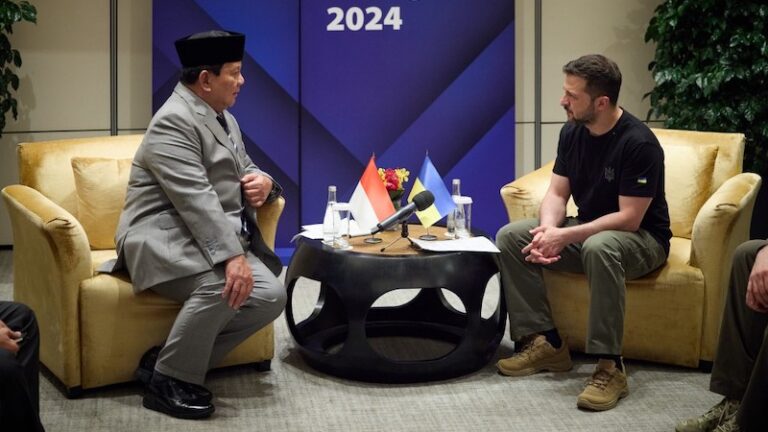Tristan Sanjaya
Indonesia justified its action by refusing to sign or explicitly support the June 2024 Ukraine Peace Summit Final Statement, emphasizing the need for an “inclusive” dialogue inviting all parties, including Russia. This move may seem puzzling, as the Final Statement does not deviate from the United Nations General Assembly (UNGA) resolutions that Indonesia voted in favor of in 2022.
But unlike the 2022 UN General Assembly, which will vote on a resolution condemning Russian aggression, Indonesia sees the 2024 peace summit as a largely Western-led effort with little chance of producing any real progress towards ending the war.
The composition of the signatories to the final Joint Statement may partly explain Indonesia’s behavior. Of the 85 signatories, 53 were Western countries or organizations, and Russia did not participate in the meeting. As the majority of signatories were from the Northern Hemisphere and the meeting did not include Moscow, the Indonesian government wanted to avoid being seen as overly aligned with Western countries in a Western-led meeting. Such alignment could be seen as contradictory to Indonesia’s “free and proactive” foreign policy.
The exclusivity of summits contrasts with proceedings in formal international organizations such as the United Nations, where assumed neutrality and convening power allow states to be more confident in expressing their views on international affairs in general, especially vis-à-vis major powers.
Indonesia was confident of voting to condemn Russia at the 2022 UN General Assembly, given the inclusiveness of the proceedings, with almost all UN member states, including Russia, taking part in the proceedings. Taking place in a neutral environment, the UN General Assembly gave it more legitimacy than the Ukraine peace summit in Switzerland.
However, although Indonesia has some reservations about the procedure and composition of participants at the Ukraine Peace Summit, it continues to support Ukraine’s territorial integrity, sovereignty and the fundamental principles of peace.
A few days before the summit, Ukrainian President Volodymyr Zelenskyy met with Indonesian Defense Minister Prabowo Subianto at the 2024 Shangri-La Dialogue. The two discussed the need for peace, with the Ukrainian president saying:[s] The president expressed a “positive attitude” to Indonesia’s support for maintaining his country’s territorial integrity and sovereignty, and said he hoped Indonesia would send a “highest-level” delegation to the Ukraine peace summit.
Indonesia’s actions are seen as an attempt to reconcile competing interests: supporting Ukraine by attending the summit while trying to avoid aligning with the West by refusing to sign the final statement.
Indonesia’s insistence on including Russia in peace talks reflects its desire to end the fighting as quickly as possible, regardless of whether it is justified or unjustified by Ukraine, a stance reflected in Prabowo’s proposed 2023 Shangri-La peace plan, which includes a ceasefire and a UN-supervised referendum.
This attitude was also seen during the visit to Ukraine by Indonesian President Joko Widodo, who is due to leave office in 2022. President Widodo was overwhelmingly focused on the need for global economic stability, especially rising food and energy costs, rather than Ukraine’s struggle against Russian aggression. Indonesia may be hoping that negotiations between Russia and Ukraine will freeze the fighting and stabilize the global economy.
Even if Prabowo becomes president of Indonesia in October 2024, Indonesia’s policy towards Ukraine is unlikely to change significantly. At the 2024 Shangri-La Dialogue, Prabowo said that the 2023 ceasefire proposal was still “[n]It is necessary as an intermediate solution.
But while Joko Widodo’s government has been reticent about Ukraine unless it concerns Indonesia’s interests, the new administration may be more vocal about the need for a ceasefire, and Prabowo has said he wants Indonesia to play a more active role in world affairs.
While freezing the fighting in Ukraine would partially satisfy Indonesia’s domestic needs, it must consider the long-term implications of a decline in compliance with international law, especially by major powers. Insisting on a ceasefire after a superpower invades a neighboring country could set a dangerous precedent that would see the aggressor country effectively assume control of the invaded territory.
There is also the possibility that China may embark on dangerous military actions, such as an invasion of disputed islands in the South China Sea controlled by the Philippines or Vietnam. China knows it will be pressured to implement a ceasefire and lock in its gains. Indonesia is not in the best interest of Indonesia and risks undermining its security if it continues to pursue a ceasefire.
- About the author: Tristant Sanjaya is a Master of Science student in Geopolitics and Business at the École Supérieure Commerce de Rennes, France, and a recipient of the “France Excellence” scholarship.
- Source: This article was published by East Asia Forum


